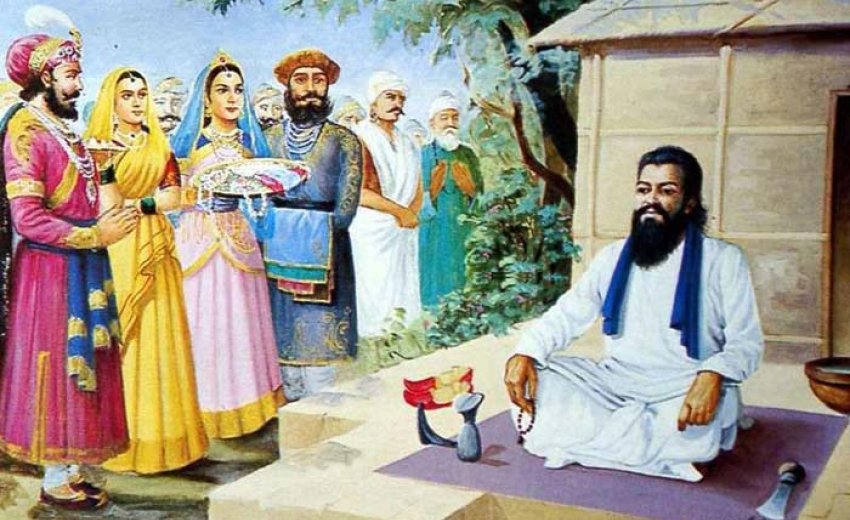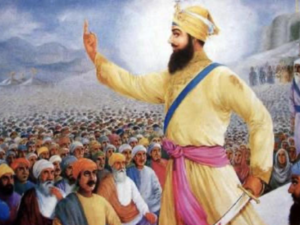Bhagat Ravidas, a revered saint-poet of the Bhakti movement, holds a significant place in Sikh philosophy and the teachings of the Sikh Gurus. His compositions in Sri Guru Granth Sahib emphasize devotion, humility, and the rejection of caste discrimination. The Sikh Gurus, especially Guru Nanak Dev Ji, Guru Ram Das Ji, and Guru Arjan Dev Ji, acknowledged and upheld Bhagat Ravidas’ spiritual wisdom. This study explores the relationship between Bhagat Ravidas and Sikhism, examining textual evidence, historical accounts, and doctrinal alignments that underscore their shared vision of social equality, divine devotion, and human unity.
The Sikh tradition is distinct in its emphasis on equality, rejecting caste-based divisions and embracing a universal human identity. One of the most remarkable aspects of Sikhism is its inclusion of the hymns of Bhagat Ravidas, a saint from the so-called “lower caste” of Chamars, in Sri Guru Granth Sahib. The Sikh Gurus not only respected Bhagat Ravidas’ teachings but also actively incorporated his philosophy into the Sikh worldview, reinforcing the principles of spiritual liberation and social reform. This article explores Bhagat Ravidas’ influence on Sikhism, his possible interactions with Guru Nanak Dev Ji, and his status within the Sikh scriptural and historical tradition.
Bhagat Ravidas was born in the 15th century, and by the time Guru Nanak Dev Ji emerged as a spiritual leader, Ravidas was already an established saint, likely in his seventies. While historical records do not provide definitive proof of their meeting, several sources suggest that Guru Nanak Dev Ji was aware of Bhagat Ravidas’ teachings.Ancient texts, including the writings of Mahirvan, mention that Guru Nanak Dev Ji, during his travels, encountered the bani (hymns) of various Bhakti saints, including Bhagat Ravidas, Bhagat Kabir, and Bhagat Namdev. Furthermore, Sikh tradition acknowledges that Guru Nanak Dev Ji and his companions frequently sang the verses of Bhakti saints, including those of Bhagat Ravidas. This indicates a strong doctrinal and spiritual connection between them.
The inclusion of Bhagat Ravidas’ compositions in Sri Guru Granth Sahib by Guru Arjan Dev Ji is a testament to his profound spiritual influence. A total of 40 hymns of Bhagat Ravidas appear in Sri Guru Granth Sahib, covering themes such as divine love, self-realization, and liberation from social and material bondage.
Guru Ram Das Ji, in his bani, praises Bhagat Ravidas for transcending social limitations through divine devotion:
“Ravidasu chamaru Hari kirati nimakh ek nau
Patan te uttam bhaya chari varan paaye paaye aaye.”
(Sri Guru Granth Sahib, p. 1196)
This verse highlights that Bhagat Ravidas, despite his so-called low birth, attained spiritual greatness, drawing people from all castes towards him. Guru Arjan Dev Ji also acknowledged Bhagat Ravidas’ equal status among great saints:
“Let Kabir Dasu Dasnu Ko Utmu Senu Nai
High and high Namadeu Samdarsi became Ravidas Thakar.”
(Sri Guru Granth Sahib, p. 1207)
The hymns of Bhagat Ravidas emphasize that divine realization is not limited by caste or social status. His verse in Sri Guru Granth Sahib states:
“Jaise jal mein kamal alep, mrig-trishna nivare
Taise hi sansar mein, raho Gobind samare.”
(Sri Guru Granth Sahib, p. 658)
This philosophy aligns closely with the Sikh Gurus’ rejection of ritualism and caste-based discrimination.
The teachings of Bhagat Ravidas and the Sikh Gurus converge on the fundamental principle of social equality. Sikhism stands against casteism not just in theory but in practice. The Sikh Gurus emphasized that all humans, irrespective of birth, are capable of achieving spiritual enlightenment.
Guru Nanak Dev Ji declared:
“Neecha andar neech jaat, neechi hu ati neech
Nanak tin ke sang saath, vadian siu kya rees.”
(Sri Guru Granth Sahib, p. 15)
This echoes Bhagat Ravidas’ assertion:
“Begumpura shehar ko nao
Dukh andohu nahi tihi thao.”
(Sri Guru Granth Sahib, p. 345)
Both traditions envision a spiritual state where caste and social hierarchies dissolve, and every individual is equal before the Divine.
Guru Arjan Dev Ji, while compiling Sri Guru Granth Sahib, made a groundbreaking decision by including the hymns of Bhakti saints, such as Bhagat Ravidas, Bhagat Namdev, and Bhagat Kabir, alongside the compositions of the Sikh Gurus. This reflected Sikhism’s commitment to universality and social inclusivity.
Bhai Gurdas Ji, a revered Sikh scholar, also praised Bhagat Ravidas in his Vaaran, highlighting his spiritual depth and rejection of caste-based restrictions:
“Bhagat Ravidas chamreta
Pan gunte raho pakir
Kulla dharma lapeta
Asan dhoti keete patka
Chahun varna updesa
Bhakti bhala japu gyan.”
(Bhai Gurdas Ji, Vaar 10, Pauri 17)
This further affirms that within the Sikh tradition, Bhagat Ravidas was recognized as an enlightened soul whose teachings aligned with the Gurmat ideology.
Bhagat Ravidas remains an integral part of Sikh spiritual and philosophical discourse. His hymns in Sri Guru Granth Sahib reinforce Sikhism’s core principles of devotion, equality, and rejection of casteism. The Sikh Gurus not only acknowledged his teachings but also incorporated them into Sikh scripture, ensuring their perpetual reverence within the Sikh tradition.By including the bani of Bhagat Ravidas and other Bhakti saints, Guru Arjan Dev Ji demonstrated that spirituality transcends social classifications. Today, as Sikhs and followers of Bhagat Ravidas recite Sri Guru Granth Sahib, they continue to honor the shared legacy of social justice, spiritual liberation, and universal equality that unites the teachings of Bhagat Ravidas and the Sikh Gurus.





